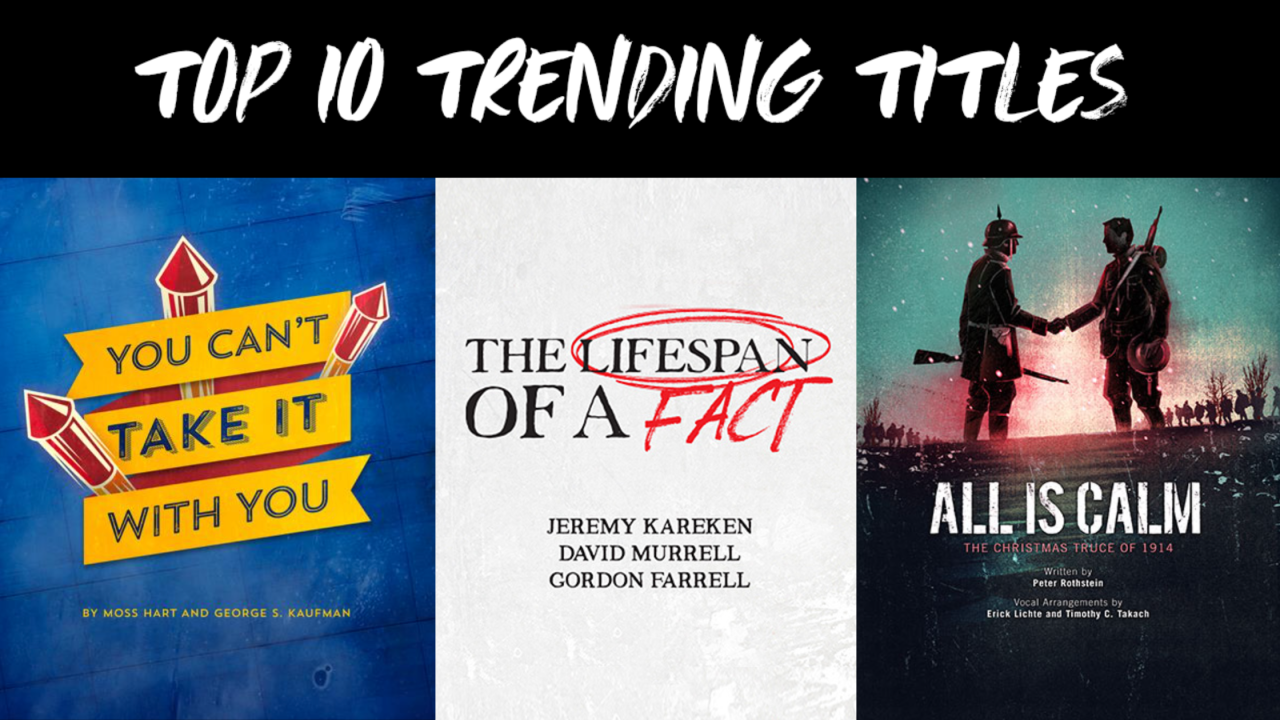What’s hot at Broadway Licensing Group? Check out the top trending titles of the week from Broadway Licensing, Dramatists Play Service, and Playscripts.
1. A Krampus Carol by Brent Holland
THE STORY: On Christmas Eve, Santa Claus’s oft-forgotten demon partner, Krampus, is visited by the ghost of Jacob Marley, who hopes to get him to see the error of his ways. But the joke’s on Marley: Krampus loves his life! So, what if his method for punishing kids who misbehave lost him the respect of his family, friends, and the elves who work for him? He doesn’t have a problem with that, and spying on the past, present, and future isn’t going to change his mind! Hilarious and irreverent, A Krampus Carol pits Dickens’s classic redemption tale against a stubborn holiday fiend who doesn’t think he needs to be saved.
2. All Is Calm: The Christmas Truce of 1914 by Peter Rothstein, Erick Lichte, and Timothy C. Takach
THE STORY: The Western Front: Christmas 1914. Out of the violence of World War I, a silence, then a song. A German soldier steps into No Man’s Land singing “Stille Nacht.” Thus begins an extraordinary night of camaraderie, music, and peace. An a cappella chorale, All Is Calm is a remarkable true story in the words and songs of the men who lived it.
3. Community Garden by Justin Borak
THE STORY: Uptown, Chicago, newbie Ralph doesn’t quite know what to expect during his first volunteer shift at Uptown City Gardens. It’s certainly not the vibrant, bustling community that passes through the green space, checking on their plants, composting their food scraps, meeting up with friends, and—surprisingly often—falling in love. After a few hours, Ralph begins to understand seasoned volunteer Donald’s claim that the garden is magic. In a series of heartfelt and humorous vignettes, Community Garden digs into the ways taking care of the environment helps people take care of each other.
4. Denny the Dinosaur by Florence Milazzo, AnnMarie Milazzo, and Adam Wachter
THE STORY: Denny is your average Tyrannosaurus Rex in all ways except one: his less-than-average size! School bully Marcus teases him because of his differences, but when the class turns to Denny to save the day, he learns it’s the deeds he does that make him strong. A prehistoric musical that celebrates the unique strengths in us all!
5. Harvey by Mary Chase
THE STORY: Elwood P. Dowd insists on including his friend Harvey in all of his sister Veta’s social gatherings. The trouble is, Harvey is an imaginary six-and-a-half-foot-tall rabbit. To avoid future embarrassment for her family—and especially for her daughter, Myrtle Mae—Veta decides to have Elwood committed to a sanitarium. At the sanitarium, a frantic Veta explains to the staff that her years of living with Elwood’s hallucination have caused her to see Harvey also, and so the doctors mistakenly commit her instead of her mild-mannered brother. The truth comes out, however; Veta is freed, and the search is on for Elwood, who eventually arrives at the sanitarium of his own volition, looking for Harvey. But it seems that Elwood and his invisible companion have had a strange influence on more than one of the doctors. Only at the end does Veta realize that maybe Harvey isn’t so bad after all. Winner of the 1945 Pulitzer Prize for Drama
6. The Curious Savage by John Patrick
THE STORY: Mrs. Savage has been left ten million dollars by her husband and wants to make the best use of it, in spite of her grown-up stepchildren’s efforts to get their hands on it. Knowing that the widow’s wealth is now in negotiable securities, and seeing they cannot get hold of the fortune, the stepchildren commit her to a sanatorium hoping to “bring her to her senses.” In the sanatorium Mrs. Savage meets various social misfits, men and women who just cannot adjust themselves to life, people who need the help Mrs. Savage can provide. In getting to know them, she realizes that she will find happiness with them and plans to spend the rest of her life as one of them. But when the doctor tells her there is no reason why she should remain, she hesitates to go out into a hard world where people seem ready to do anything for money. The self-seeking stepchildren are driven to distraction by their vain efforts to browbeat Mrs. Savage, but she preserves her equanimity and leads them on a merry chase. At last, her friends conspire to get rid of her stepchildren, and through their simple belief in the justice of her cause, they enable Mrs. Savage to carry out her plans to establish a fund to help others realize their hopes and dreams. The dominant mood is high comedy, and the audience is left with a feeling that the neglected virtues of kindness and affection have not been entirely lost in a world that seems at times motivated only by greed and dishonesty.
7. The Gifts of the Magi by Randy Courts and Mark St. Germain
THE STORY: It is Christmas in New York, but for two young lovers, Jim and Della, the prospects are bleak, as both are out of work and penniless. But as those familiar with the famous O. Henry story are aware, their dilemma is solved when both part with their most precious possessions (she her beautiful long hair, he his heirloom pocket watch) in order to buy presents for each other thereby creating, at least for a magical moment, an aura of warmth and giving in the cold, impersonal winter city.
8. The Lifespan of a Fact by Jeremy Kareken & David Murrell and Gordon Farrell
THE STORY: Jim Fingal is a fresh-out-of-Harvard fact checker for a prominent but sinking New York magazine. John D’Agata is a talented writer with a transcendent essay about the suicide of a teenage boy—an essay that could save the magazine from collapse. When Jim is assigned to fact check D’Agata’s essay, the two come head to head in a comedic yet gripping battle over facts versus truth. Based on the book by John D’Agata and Jim Fingal.
9. Trap by Stephen Gregg
THE STORY: Menachap, California. An incomprehensible event: every person in the audience of a high school play falls unconscious–every person but one. Using interviews with witnesses, loved ones, first responders, and the investigators pursuing the case, a theatre ensemble brings the story of the strange event to life, documentary-style. But as the strands weave together into an increasingly dangerous web, it becomes clear that this phenomenon might not be entirely in the past. Unnerving, exhilarating, and wildly inventive, you’ve never walked into anything quite like Trap.
10. You Can’t Take It with You by Moss Hart and George S. Kaufman
THE STORY: At first the Sycamores seem mad, but it is not long before we realize that if they are mad, the rest of the world is madder. In contrast to these delightful people are the unhappy Kirbys. The plot shows how Tony, attractive young son of the Kirbys, falls in love with Alice Sycamore and brings his parents to dine at the Sycamore home on the wrong evening. The shock sustained by the Kirbys, who are invited to eat cheap food, shows Alice that marriage with Tony is out of the question. The Sycamores, however, though sympathetic to Alice, find it hard to realize her point of view. Meantime, Tony, who knows the Sycamores are right and his own people wrong, will not give her up, and in the end, Mr. Kirby is converted to the happy madness of the Sycamores, particularly since he happens in during a visit by an ex-Grand Duchess, earning her living as a waitress. No mention has as yet been made of the strange activities of certain members of the household engaged in the manufacture of fireworks; nor of the printing press set up in the parlor; nor of Rheba the maid and her friend Donald; nor of Grandpa’s interview with the tax collector when he tells him he doesn’t believe in the income tax. Winner of the 1937 Pulitzer Prize for Drama.





